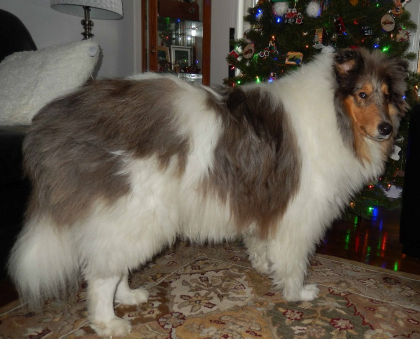Press Releases
VetStem Cell Therapy Improves Quality of Life in Collie with Inflammatory Bowel Disease
Casey, a Collie, was successfully treated for inflammatory bowel disease with VetStem Cell Therapy.
2022-07-19 --
Casey, a Collie, began experiencing digestive problems at just three months old. When he was approximately five months old, he was not eating well, was losing weight, and had diarrhea. This led to many veterinary appointments for blood tests, X-rays, and eventually an ultrasound and biopsy of his stomach and small intestine. The biopsy results supported a diagnosis of inflammatory bowel disease (IBD).
IBD is a gastrointestinal disease that can affect both cats and dogs. It is characterized by inflammation of the intestines and can cause vomiting, diarrhea, reduced appetite, and weight loss. While the underlying cause of IBD remains unknown, evidence suggests that the possible causes may be genetics, autoimmune related, environmentally induced, or microbial in nature.
In an effort to control Casey’s symptoms, he was put on several medications and a specialized diet. His owners commented that this regiment was a nightmare and that Casey would not eat the specialized hypoallergenic diet that he was prescribed. Additionally, his fur never grew back where he was shaved for the ultrasound and he was not playing at all. His owners tried more medications, all to no avail.
Eventually, Casey’s liver blood values became elevated. After a liver biopsy, it was determined that all of the medications were negatively affecting Casey’s liver. It was at this time that Casey’s veterinarian suggested treatment with VetStem Cell Therapy.
VetStem, a veterinary regenerative medicine company located in California, is currently researching the use of stem cells for the treatment of IBD. Mesenchymal stem cells have demonstrated the ability to migrate to areas of inflammation, down-regulate inflammation, modulate the immune system, stimulate neoangiogenesis (formation of new blood vessels), and repair damaged tissue. Additionally, multiple clinical studies have demonstrated that intravenous administration of adipose (fat) derived stem cells could ameliorate the clinical signs of IBD. While more research is needed, preliminary results suggest that VetStem Cell Therapy can improve the symptoms of some dogs and cats with IBD.
To begin the process, Casey’s veterinarian collected fat tissue from his abdomen in a minimally invasive anesthetic procedure. Once collected, the fat was aseptically packaged and shipped to the VetStem processing laboratory in Poway, California. Lab technicians processed the fat to extract and concentrate the stem and regenerative cells contained therein. Due to the severity of Casey’s condition, he received an IV dose of his own stem cells in June 2021, July 2021, September 2021, January 2022, and April 2022.
After his dose in January 2022, Casey’s owners began to notice major improvements. His owner noted that he was eating better, gaining weight, and all of his fur had grown back. Additionally, his stools are better and he’s taking just a small dose of a single medication every other day. His owners were also very excited that Casey began to play. His owner commented, “His stools are great. But best of all, he plays. He plays with us and has two dog friends that he actually really plays with. Almost every day he runs, he chases a thrown stuffy, he rolls on his back (he never did before) and he sleeps for longer periods at a time. He is getting better every day it seems. Casey’s veterinarian and the stem cell treatments saved his life and gave our pup back to us.”
Casey’s case was handled under VetStem’s clinical research department, as there is limited data to support the use of stem cell therapy for the treatment IBD. Since this condition develops for different reasons and the severity of the disease varies, the stem cell protocol and outcome can differ for each dog or cat. Any inquiries regarding treatment of similar conditions or other non-standard indications should be directed to VetStem personnel.








